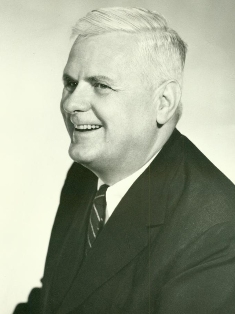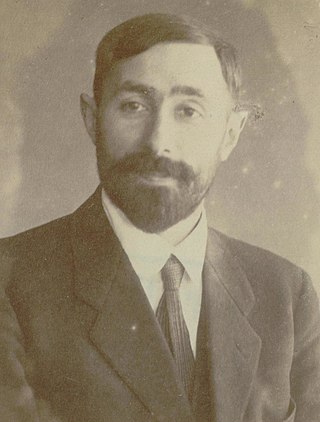Related Research Articles
In mathematics and computer science, currying is the technique of translating a function that takes multiple arguments into a sequence of families of functions, each taking a single argument.
In computer science, functional programming is a programming paradigm where programs are constructed by applying and composing functions. It is a declarative programming paradigm in which function definitions are trees of expressions that map values to other values, rather than a sequence of imperative statements which update the running state of the program.
Lambda calculus is a formal system in mathematical logic for expressing computation based on function abstraction and application using variable binding and substitution. It is a universal model of computation that can be used to simulate any Turing machine. It was introduced by the mathematician Alonzo Church in the 1930s as part of his research into the foundations of mathematics.
Haskell Brooks Curry was an American mathematician and logician. Curry is best known for his work in combinatory logic, whose initial concept is based on a paper by Moses Schönfinkel, for which Curry did much of the development. Curry is also known for Curry's paradox and the Curry–Howard correspondence. Named for him are three programming languages: Haskell, Brook, and Curry, and the concept of currying, a method to transform functions, used in mathematics and computer science.

Alonzo Church was an American mathematician, computer scientist, logician, and philosopher who made major contributions to mathematical logic and the foundations of theoretical computer science. He is best known for the lambda calculus, the Church–Turing thesis, proving the unsolvability of the Entscheidungsproblem, the Frege–Church ontology, and the Church–Rosser theorem. Alongside his doctoral student Alan Turing, Church is considered one of the founders of computer science.
Combinatory logic is a notation to eliminate the need for quantified variables in mathematical logic. It was introduced by Moses Schönfinkel and Haskell Curry, and has more recently been used in computer science as a theoretical model of computation and also as a basis for the design of functional programming languages. It is based on combinators, which were introduced by Schönfinkel in 1920 with the idea of providing an analogous way to build up functions—and to remove any mention of variables—particularly in predicate logic. A combinator is a higher-order function that uses only function application and earlier defined combinators to define a result from its arguments.
In programming language theory and proof theory, the Curry–Howard correspondence is the direct relationship between computer programs and mathematical proofs.
Curry is a declarative programming language, an implementation of the functional logic programming paradigm, and based on the Haskell language. It merges elements of functional and logic programming, including constraint programming integration.
A typed lambda calculus is a typed formalism that uses the lambda-symbol to denote anonymous function abstraction. In this context, types are usually objects of a syntactic nature that are assigned to lambda terms; the exact nature of a type depends on the calculus considered. From a certain point of view, typed lambda calculi can be seen as refinements of the untyped lambda calculus, but from another point of view, they can also be considered the more fundamental theory and untyped lambda calculus a special case with only one type.

Moses Ilyich Schönfinkel was a logician and mathematician, known for the invention of combinatory logic.
The SKI combinator calculus is a combinatory logic system and a computational system. It can be thought of as a computer programming language, though it is not convenient for writing software. Instead, it is important in the mathematical theory of algorithms because it is an extremely simple Turing complete language. It can be likened to a reduced version of the untyped lambda calculus. It was introduced by Moses Schönfinkel and Haskell Curry.
In computer science and logic, a dependent type is a type whose definition depends on a value. It is an overlapping feature of type theory and type systems. In intuitionistic type theory, dependent types are used to encode logic's quantifiers like "for all" and "there exists". In functional programming languages like Agda, ATS, Coq, F*, Epigram, Idris, and Lean, dependent types help reduce bugs by enabling the programmer to assign types that further restrain the set of possible implementations.

Programming language theory (PLT) is a branch of computer science that deals with the design, implementation, analysis, characterization, and classification of formal languages known as programming languages. Programming language theory is closely related to other fields including mathematics, software engineering, and linguistics. There are a number of academic conferences and journals in the area.
Algebraic Logic Functional (ALF) programming language combines functional and logic programming techniques. Its foundation is Horn clause logic with equality, which consists of predicates and Horn clauses for logic programming, and functions and equations for functional programming.
In computer science, lambda calculi are said to have explicit substitutions if they pay special attention to the formalization of the process of substitution. This is in contrast to the standard lambda calculus where substitutions are performed by beta reductions in an implicit manner which is not expressed within the calculus; the "freshness" conditions in such implicit calculi are a notorious source of errors. The concept has appeared in a large number of published papers in quite different fields, such as in abstract machines, predicate logic, and symbolic computation.
The categorical abstract machine (CAM) is a model of computation for programs that preserves the abilities of applicative, functional, or compositional style. It is based on the techniques of applicative computing.
Applicative computing systems, or ACS are the systems of object calculi founded on combinatory logic and lambda calculus. The only essential notion which is under consideration in these systems is the representation of object. In combinatory logic the only metaoperator is application in a sense of applying one object to other. In lambda calculus two metaoperators are used: application – the same as in combinatory logic, and functional abstraction which binds the only variable in one object.
In the branches of mathematical logic known as proof theory and type theory, a pure type system (PTS), previously known as a generalized type system (GTS), is a form of typed lambda calculus that allows an arbitrary number of sorts and dependencies between any of these. The framework can be seen as a generalisation of Barendregt's lambda cube, in the sense that all corners of the cube can be represented as instances of a PTS with just two sorts. In fact, Barendregt (1991) framed his cube in this setting. Pure type systems may obscure the distinction between types and terms and collapse the type hierarchy, as is the case with the calculus of constructions, but this is not generally the case, e.g. the simply typed lambda calculus allows only terms to depend on terms.
In the area of mathematical logic and computer science known as type theory, a type constructor is a feature of a typed formal language that builds new types from old ones. Basic types are considered to be built using nullary type constructors. Some type constructors take another type as an argument, e.g., the constructors for product types, function types, power types and list types. New types can be defined by recursively composing type constructors.
References
- 1 2 Antoy, Sergio, and Michael Hanus. "Functional logic programming." Commun. ACM 53.4 (2010): 74–85.
- ↑ Hanus, Michael, Herbert Kuchen, and Juan Jose Moreno-Navarro. "Curry: A truly functional logic language." Proc. ILPS. Vol. 95. No. 5. 1995.
- ↑ AUGUSTSSON, BREITNER, CLAESSEN, JHALA, PEYTON JONES, SHIVERS, SWEENEY. "The Verse Calculus: a Core Calculus for Functional Logic Programming."
- ↑ Kuchen, Herbert. "The Journal of Functional and Logic Programming". University of Münster.